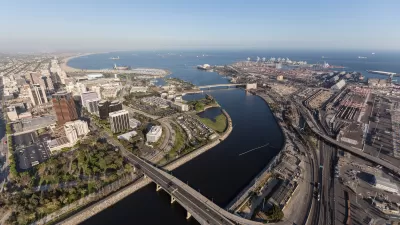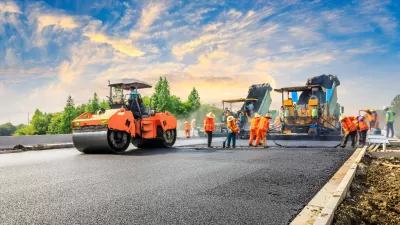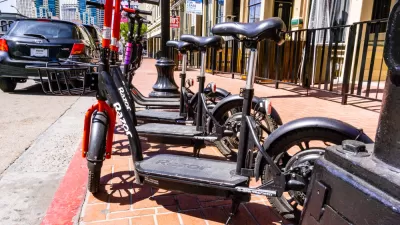At some point in the past 35 years, the word infrastructure became common in policy discussions and even in the common tongue. But why did we suddenly prefer the word "infrastructure" to other terms like "public works"?
Alex Marshall pens an article inspired by the word "Infrastructure" and its strange rise to prominence over the past 50 years. According to Marshall, "this word 'infrastructure,' which I just managed to use five times in one paragraph without explanation, was not in common discourse 35 years ago in the U.S. and was just about unknown 50 years ago. Where did it come from, and what does its rise mean?"
To back up that claim, Marshall uses Google's Ngram Viewer, discovering that in English, "'infrastructure' was hardly used until about 1960, after which it climbed steadily, taking off after 1980."
So what does it mean, that the word has taken a much more prominent place in the common lexicon? "For me, the way this new word rose up and replaced older terms like 'public works' is interesting and significant. Building roads and bridges where none existed before – 'public works' -- is one thing. Viewing such projects as interconnected, mutually dependent systems that move us from place to place and serve as a primary engine of commerce – 'infrastructure' -- is quite another."
The article includes more evidence about how the usage of the word infrastructure has changed over the years along with more of the implications of that evolution.
FULL STORY: Why the Word ‘Infrastructure’ Replaced 'Public Works'

Alabama: Trump Terminates Settlements for Black Communities Harmed By Raw Sewage
Trump deemed the landmark civil rights agreement “illegal DEI and environmental justice policy.”

Study: Maui’s Plan to Convert Vacation Rentals to Long-Term Housing Could Cause Nearly $1 Billion Economic Loss
The plan would reduce visitor accommodation by 25% resulting in 1,900 jobs lost.

Planetizen Federal Action Tracker
A weekly monitor of how Trump’s orders and actions are impacting planners and planning in America.

Wind Energy on the Rise Despite Federal Policy Reversal
The Trump administration is revoking federal support for renewable energy, but demand for new projects continues unabated.

Passengers Flock to Caltrain After Electrification
The new electric trains are running faster and more reliably, leading to strong ridership growth on the Bay Area rail system.

Texas Churches Rally Behind ‘Yes in God’s Back Yard’ Legislation
Religious leaders want the state to reduce zoning regulations to streamline leasing church-owned land to housing developers.
Urban Design for Planners 1: Software Tools
This six-course series explores essential urban design concepts using open source software and equips planners with the tools they need to participate fully in the urban design process.
Planning for Universal Design
Learn the tools for implementing Universal Design in planning regulations.
Caltrans
Smith Gee Studio
Institute for Housing and Urban Development Studies (IHS)
City of Grandview
Harvard GSD Executive Education
Toledo-Lucas County Plan Commissions
Salt Lake City
NYU Wagner Graduate School of Public Service





























